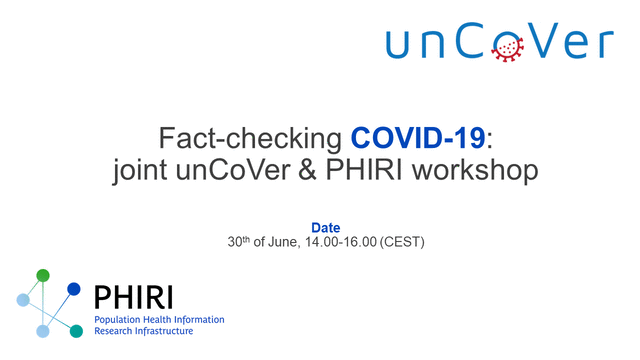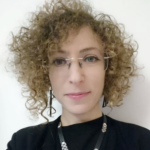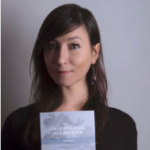Fact-checking COVID-19: joint unCoVer & PHIRI workshop’

INTRODUCTION
We have all experienced, especially during the current pandemic, that information can be overwhelming. When there is an overabundance of information – an infodemic – it can be hard to clearly distinguish between good and bad information. For this reason, unCoVer and PHIRI were excited to organize the Fact-checking COVID-19 Workshop which took place on the 30th of June, 14.00-16.00 CEST.
Watch the recording of the event here on the unCoVer YouTube channel!
THE WORKSHOP
- After a brief introduction of the projects UnCoVer and PHIRI, experts with different backgrounds (from masters of big data to journalists) presented key contemporary topics where communicating science to the general public is essential but not an easy task.
- Sequentially, experts from the University of Liverpool and the University of Dundee introduced the participants to the FakeNews Immunity chatbot – an incredible tool which aims to increase resistance to mis and disinformation in citizens by teaching them how to spot fallacies (arguments that appear to be valid but are not) and identify misleading or deceptive stories.
- Finally, the participants were divided in breakout rooms where they were able to explore the presented tool and hear one thing or two about fallacies from Aristotle, Gorgias, and Socrates themselves.
AGENDA - 30th of June
- 14:00 | Opening – José L. Peñalvo
- 14:05 | Presentation of the unCoVer/ PHIRI network – José L. Peñalvo & Petronille Bogaert
- 14:15 | Vaccine safety, efficacy and role in emerging variants – Gunhild Nyborg
- 14:30 | Opportunities and challenges for using big data against COVID-19 – Alejandro Rodríguez-González
- 14:45 | Q&A – José L. Peñalvo
- 15:00 | Do’s and don’ts when communicating scientific information to the public – Hernâni OIiveira
- 15:15 | Infodemic management: building resilience to mis/disinformation – Elena Musi & Elinor Carmi
- 15:25 | Explanation of the Vaccinating News Chatbot and breakout rooms – Elena Musi & Elinor Carmi
- 15:45 | Q&A – Petronille Bogaert
- 15:55 | Concluding remarks – Petronille Bogaert
SPEAKERS
 José L. Peñalvo, PharmD, PhD, is a Professor of Public Health and the Head of Non-Communicable Diseases Unit at the Institute of Tropical Medicine in Antwerp (Belgium). He has a strong background in clinical research, epidemiology methods and expertise in chronic disease epidemiology evidence synthesis, and quantifying and modeling health impacts, and effectiveness of population-based strategies to reduce chronic disease burden. Dr. Peñalvo is an expert in the use of large clinical catalogs such as electronic medical records and registry data, as well as epidemiological databases to support effectiveness studies. He is currently leading research efforts to use real-world data (RWD) to understand and mitigate the increased fatality of COVID-19 among chronic patients. Dr. Peñalvo is the coordinator of unCoVer, a H2020 project dedicated to the pooled analysis of RWD (e.g. electronic health records, patient’s registers) generated through the provision of care to COVID19 patients from 29 partners in Europe and internationally. @JosePenalvo
José L. Peñalvo, PharmD, PhD, is a Professor of Public Health and the Head of Non-Communicable Diseases Unit at the Institute of Tropical Medicine in Antwerp (Belgium). He has a strong background in clinical research, epidemiology methods and expertise in chronic disease epidemiology evidence synthesis, and quantifying and modeling health impacts, and effectiveness of population-based strategies to reduce chronic disease burden. Dr. Peñalvo is an expert in the use of large clinical catalogs such as electronic medical records and registry data, as well as epidemiological databases to support effectiveness studies. He is currently leading research efforts to use real-world data (RWD) to understand and mitigate the increased fatality of COVID-19 among chronic patients. Dr. Peñalvo is the coordinator of unCoVer, a H2020 project dedicated to the pooled analysis of RWD (e.g. electronic health records, patient’s registers) generated through the provision of care to COVID19 patients from 29 partners in Europe and internationally. @JosePenalvo
 Petronille Bogaert is project researcher and head of unit EU health information systems at Sciensano. Her work primarily focuses on European projects facilitating research in the area of population health information. This includes the coordination of the Population Health Information Research Infrastructure for COVID-19 (PHIRI) and the Joint Action on Health Information (InfAct). She is also leading several activities in the Joint Action Towards the European Health Data Space (TEHDAS) and HealthyCloud. She holds a double Master degree in European Public Health and a Masters in Biomedical Sciences. She is also president of the EUPHA section on Public Health Monitoring and Reporting. @PetronilleBo
Petronille Bogaert is project researcher and head of unit EU health information systems at Sciensano. Her work primarily focuses on European projects facilitating research in the area of population health information. This includes the coordination of the Population Health Information Research Infrastructure for COVID-19 (PHIRI) and the Joint Action on Health Information (InfAct). She is also leading several activities in the Joint Action Towards the European Health Data Space (TEHDAS) and HealthyCloud. She holds a double Master degree in European Public Health and a Masters in Biomedical Sciences. She is also president of the EUPHA section on Public Health Monitoring and Reporting. @PetronilleBo
 Gunhild Nyborg is a Norwegian M.D. with a PhD in epidemiology and a postdoctoral project in autoimmunity, including an immunological lab study on T cell surface markers. She also holds a BSc in Economics from the University of Oslo. Since the start of the pandemic, she has been focusing on obtaining and spreading knowledge about the pandemic with the aim to limit the spread and reduce the negative societal impacts of SARS-CoV-2.
Gunhild Nyborg is a Norwegian M.D. with a PhD in epidemiology and a postdoctoral project in autoimmunity, including an immunological lab study on T cell surface markers. She also holds a BSc in Economics from the University of Oslo. Since the start of the pandemic, she has been focusing on obtaining and spreading knowledge about the pandemic with the aim to limit the spread and reduce the negative societal impacts of SARS-CoV-2.
 Alejandro Rodríguez-González, PhD, is an Associate Professor at the Department of Computer Languages and Systems and Software Engineering at Technical University of Madrid and the principal investigator of the Medical Data Analysis laboratory (MEDAL) at Center for Biomedical Technology. His main research interests include Artificial Intelligence and Biomedical informatics field, with interest in the creation of Medical Diagnosis Systems, medical knowledge representation and the extraction of knowledge from different sources (text, social media, etc.) and the understanding of diseases. He has a degree in Computer Science, a M.Sc in Computer Science and technology in the specialty of Artificial Intelligence, a M.Sc in Engineering Decision systems and a PhD in Computer Science. His research experience includes the publication of more than 100 scientific papers. Prof. Rodríguez research experience includes the participation in more than 20 research and innovation projects at national (Spain) and international level (H2020/EIT Health) level. This participation includes being the principal investigator of two projects funded by the Spanish ministry of industry and two funded by H2020 programme. He is currently the coordinator of P4-LUCAT (Personalized medicine for lung cancer treatment: using Big Data-driven approaches for decision support) project, funded under ERA NET on Personalized Medicine JCT 2019 call.
Alejandro Rodríguez-González, PhD, is an Associate Professor at the Department of Computer Languages and Systems and Software Engineering at Technical University of Madrid and the principal investigator of the Medical Data Analysis laboratory (MEDAL) at Center for Biomedical Technology. His main research interests include Artificial Intelligence and Biomedical informatics field, with interest in the creation of Medical Diagnosis Systems, medical knowledge representation and the extraction of knowledge from different sources (text, social media, etc.) and the understanding of diseases. He has a degree in Computer Science, a M.Sc in Computer Science and technology in the specialty of Artificial Intelligence, a M.Sc in Engineering Decision systems and a PhD in Computer Science. His research experience includes the publication of more than 100 scientific papers. Prof. Rodríguez research experience includes the participation in more than 20 research and innovation projects at national (Spain) and international level (H2020/EIT Health) level. This participation includes being the principal investigator of two projects funded by the Spanish ministry of industry and two funded by H2020 programme. He is currently the coordinator of P4-LUCAT (Personalized medicine for lung cancer treatment: using Big Data-driven approaches for decision support) project, funded under ERA NET on Personalized Medicine JCT 2019 call.
Hernâni Oliveira has a double degree in Biology and Communication Sciences, and a Master’s degree in Oncology. He worked as a Science and Health Communication Researcher on iTunesU Project, at the Madeira’s Chemistry Centre – CQM and at the Sports and Medicine Research Centre from UTAD University. In parallel, he took a second master’s degree in Health Education and a PhD in Digital Media for Healthcare. Since 2014, he is focused on promoting BRIGHT, a start-up oriented to the development of technological solutions to increase therapeutic adherence.
 Elinor Carmi is a researcher, journalist and ex-radio broadcaster who has a passion for technology, digital rights, and feminism. Currently, Dr. Carmi is a Research Associate at Liverpool University, UK, working on several projects: 1) “Me and My Big Data – Developing Citizens’ Data Literacies” Nuffield Foundation funded project; 2) “Being Alone Together: Developing Fake News Immunity” UKRI funded project; 3) POST Parliamentary Academic Fellowship working with the UK’s Digital, Culture, Media & Sport Committee on the project: “Digital literacies for a healthy democracy”. In July 2020, Dr. Carmi was invited by the World Health Organisation (WHO) as a scientific expert to be part of the closed discussions to establish the foundations of Infodemiology. She also tweets @Elinor_Carmi.
Elinor Carmi is a researcher, journalist and ex-radio broadcaster who has a passion for technology, digital rights, and feminism. Currently, Dr. Carmi is a Research Associate at Liverpool University, UK, working on several projects: 1) “Me and My Big Data – Developing Citizens’ Data Literacies” Nuffield Foundation funded project; 2) “Being Alone Together: Developing Fake News Immunity” UKRI funded project; 3) POST Parliamentary Academic Fellowship working with the UK’s Digital, Culture, Media & Sport Committee on the project: “Digital literacies for a healthy democracy”. In July 2020, Dr. Carmi was invited by the World Health Organisation (WHO) as a scientific expert to be part of the closed discussions to establish the foundations of Infodemiology. She also tweets @Elinor_Carmi.
 Elena Musi is a Lecturer in Communication and Media at the University of Liverpool. At UoL, she is currently academic co-lead of the Big data and Digital inclusion theme of the Centre for Digital Humanities & Social Sciences and program director of the MSc in Data Science and Communication. Her expertise lies at the interface between theoretical and Applied Linguistics and Artificial Intelligence. Before joining the University of Liverpool, Elena worked as the Language Engineer for Alexa in Italian in the Amazon Alexa Applied Modelling and Data Science team (Cambridge, Mass.). She arrived to Amazon Alexa after having been a postdoctoral fellow at the Data Science Institute at Columbia University. Elena’s current research interweaves Artificial Intelligence and Communication Sciences with the broad aim of tracing back in a critical perspective debates about new technologies and their global impact, with particular focus on (mis)information and human-computer interaction. She is currently PI on UKRI ESRC project “Being Alone Together: Developing Fake News Immunity” and Co-investigator in the project Liverpool “COVID-SMART Pilot: Systematic Meaningful Asymptomatic Repeated Testing Evaluation: Department of health & social care (UK)”.
Elena Musi is a Lecturer in Communication and Media at the University of Liverpool. At UoL, she is currently academic co-lead of the Big data and Digital inclusion theme of the Centre for Digital Humanities & Social Sciences and program director of the MSc in Data Science and Communication. Her expertise lies at the interface between theoretical and Applied Linguistics and Artificial Intelligence. Before joining the University of Liverpool, Elena worked as the Language Engineer for Alexa in Italian in the Amazon Alexa Applied Modelling and Data Science team (Cambridge, Mass.). She arrived to Amazon Alexa after having been a postdoctoral fellow at the Data Science Institute at Columbia University. Elena’s current research interweaves Artificial Intelligence and Communication Sciences with the broad aim of tracing back in a critical perspective debates about new technologies and their global impact, with particular focus on (mis)information and human-computer interaction. She is currently PI on UKRI ESRC project “Being Alone Together: Developing Fake News Immunity” and Co-investigator in the project Liverpool “COVID-SMART Pilot: Systematic Meaningful Asymptomatic Repeated Testing Evaluation: Department of health & social care (UK)”.
Subscribe to our newsletter
the fields marked with * are required
PHIRI Work tools
 |
This project has received funding from the European Union’s Horizon 2020 research and innovation programme under grant agreement No 101018317. Disclaimer - Privacy policy |
Version 10.0
